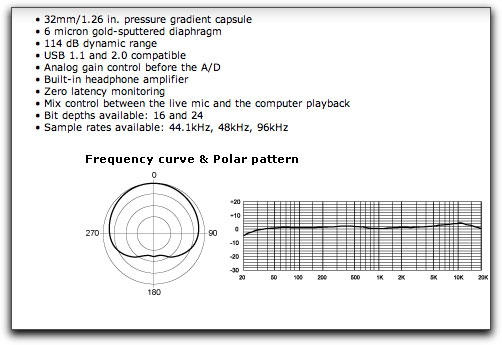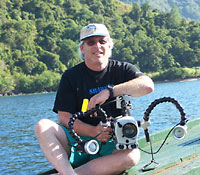
July 13, 2009
www.mxlmics.com - $399.99
Review by Steve Douglas
It has been some time since I have reviewed a USB microphone and in the MXL USB.009 we have something extra special. Just by opening the extravagant silver aluminum flight case and feeling the weight and heft of this mic you know that extra attention was paid not only to the performance of the microphone itself, but for long haul usage by developing a microphone with quality in mind.
The MXL USB. 009 Microphone is the first USB microphone I have come across that is capable of recording at 24-bit/96khz without having to buy or use expensive secondary or support equipment. The case comes fully equipped with the microphone, a heavy duty desk stand which has remained very stable throughout my testing, a hard mount stand adapter, MXL micro-fiber cleaning cloth and the appropriate cable.
The .009 really is a beautiful looking mic with a 114 db dynamic range, and an analog gain control before the A/D, a built in headphone amplifier, a mix control between the live mic and the computer playback and both 16 and 24 bit depths available. It will sample at 44.1, 48 and 96 kHz, which I have not found on any previous USB mic.

There's no question in that the microphone is easy to set up and use. You just need to go to your system preferences and set the sound to the MXL USB.009 and you are good to go. The microphone uses a cardioid pickup pattern which permits it to be more sensitive to sound waves arriving at the front of the microphone as opposed to those sounds coming from the sides and rear. This is what you want when recording a narration or an instrument. Fully compatible with either USB 1.1 or 2.0, the microphone really is a plug and play mic for either Mac or PC users without the need for special drivers or external microphone preamp, which is frequently the case with other condenser mics.
The gorgeous blue power LED lets you know that the mic is on and ready to go and is functioning correctly. The supplied USB connection cable ports into the bottom of the microphone and is of a generous length so that mic placement is quite flexible.

The only real problem I found when using the MXL USB.009 was in the use of the gain control. There are no markings of any kind so any adjustments made to the gain control are a bit of hit and miss. While it works just fine, without any markers or detents at all you are adjusting blindly. Should you go back and forth between two people or instruments, etc, you are really making a guess as to where you had the gain control set. Recordings made in Quicktime and imported to Final Cut Pro went smoothly. With the microphone set about 10 inches away, I did detect a bit of resonance in the recordings. Adjusting the gain or moving further away did not seem to fix the issue. Perhaps this was caused because I was not in a perfectly dead room, however, my editing bay is fully lined with sound deadening books on one side of the bay, a large painting made of Styrofoam on the other, two computer chairs and assorted shelves and such.
The manual supplied with the MXL USB.009 is very thorough and covers the individual set-ups for Windows users as well as those on a Mac.
This microphone is an easy solution to podcast producers and home recording editors who really need and want to capture high quality audio onto their computers with a bit rate resolution to fit any editing demand.
 Steve Douglas is a certified Apple Pro for Final Cut Pro 6 and underwater videographer. A winner of the 1999 Pacific Coast Underwater Film Competition, 2003 IVIE competition, 2004 Los Angeles Underwater Photographic competition, and the prestigious 2005 International Beneath the Sea Film Competition, where he also won the Stan Waterman Award for Excellence in Underwater Videography and 'Diver of the Year', Steve was a safety diver on the feature film "The Deep Blue Sea", contributed footage to the Seaworld Park's Atlantis production, and productions for National Geographic and the History channels. Steve is also feature writer for Asian Diver Magazine and is one of the founding organizers of the San Diego UnderSea Film Exhibition. He is available for both private and group seminars for Final Cut Pro and leads underwater filming expeditions and African safaris with upcoming excursions to the Red Sea and Egypt for Nov.2009, Feel free to contact him if you are interested in joining Steve on any of these exciting trips. www.worldfilmsandtravel.com
Steve Douglas is a certified Apple Pro for Final Cut Pro 6 and underwater videographer. A winner of the 1999 Pacific Coast Underwater Film Competition, 2003 IVIE competition, 2004 Los Angeles Underwater Photographic competition, and the prestigious 2005 International Beneath the Sea Film Competition, where he also won the Stan Waterman Award for Excellence in Underwater Videography and 'Diver of the Year', Steve was a safety diver on the feature film "The Deep Blue Sea", contributed footage to the Seaworld Park's Atlantis production, and productions for National Geographic and the History channels. Steve is also feature writer for Asian Diver Magazine and is one of the founding organizers of the San Diego UnderSea Film Exhibition. He is available for both private and group seminars for Final Cut Pro and leads underwater filming expeditions and African safaris with upcoming excursions to the Red Sea and Egypt for Nov.2009, Feel free to contact him if you are interested in joining Steve on any of these exciting trips. www.worldfilmsandtravel.com